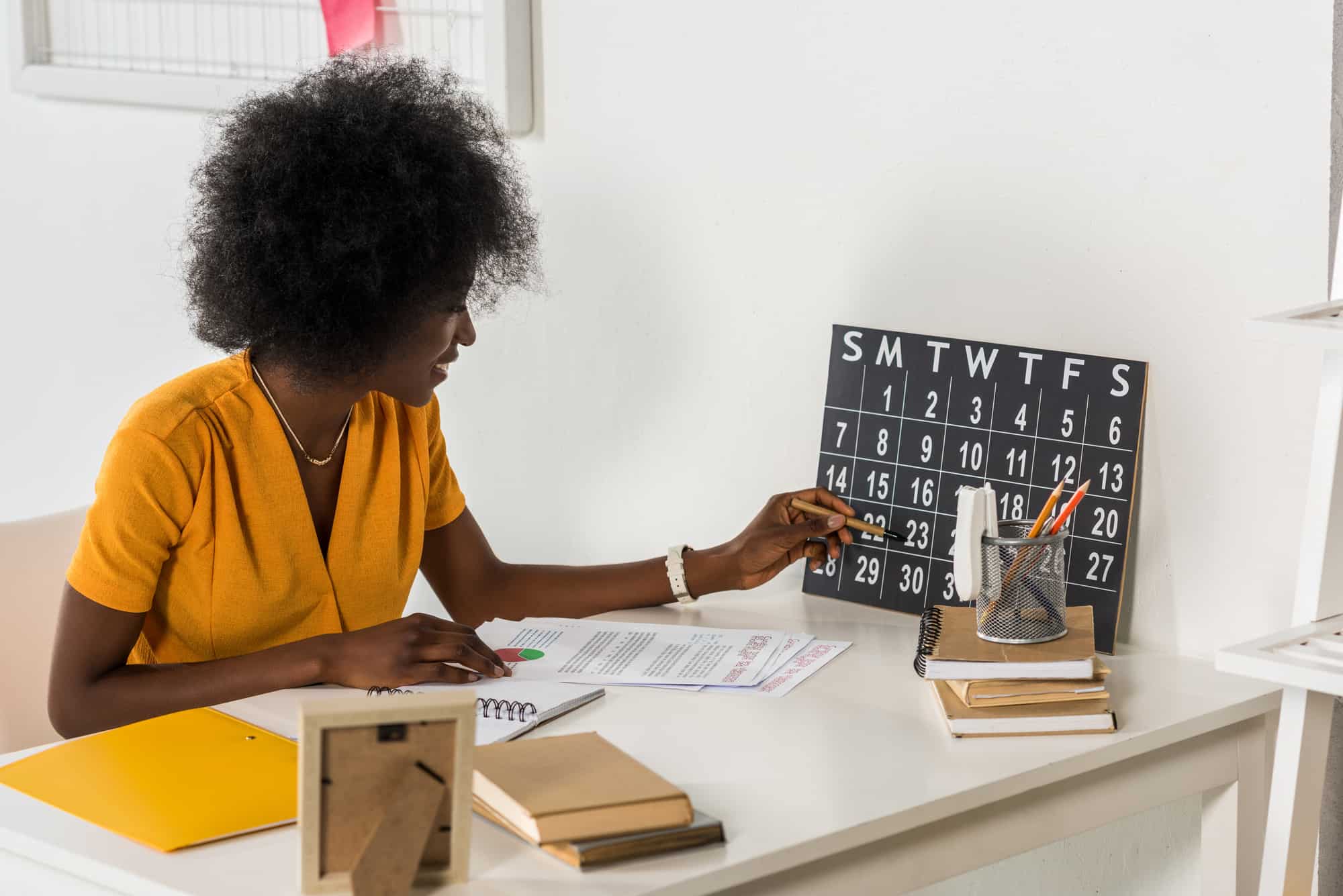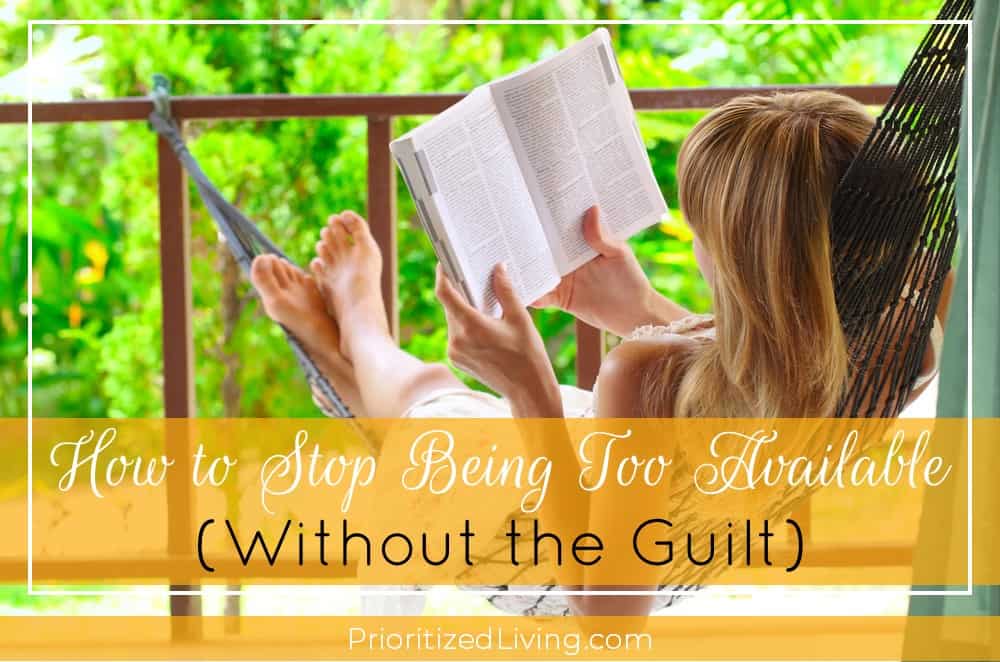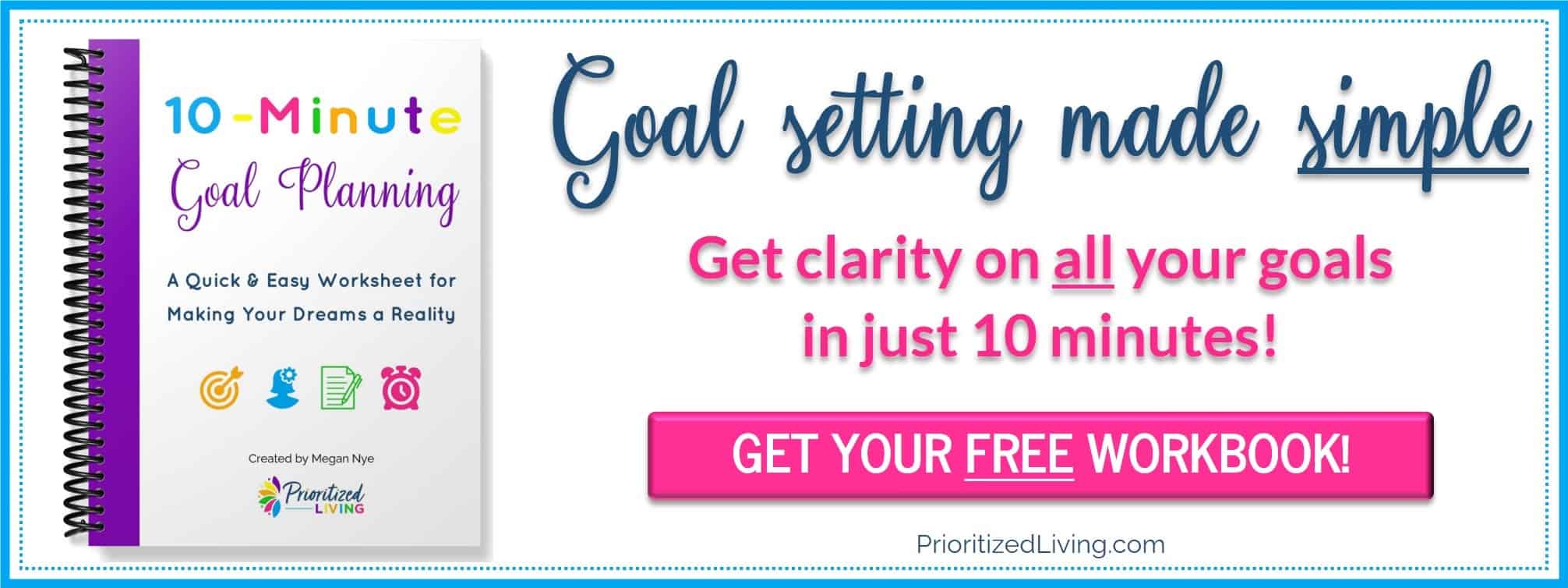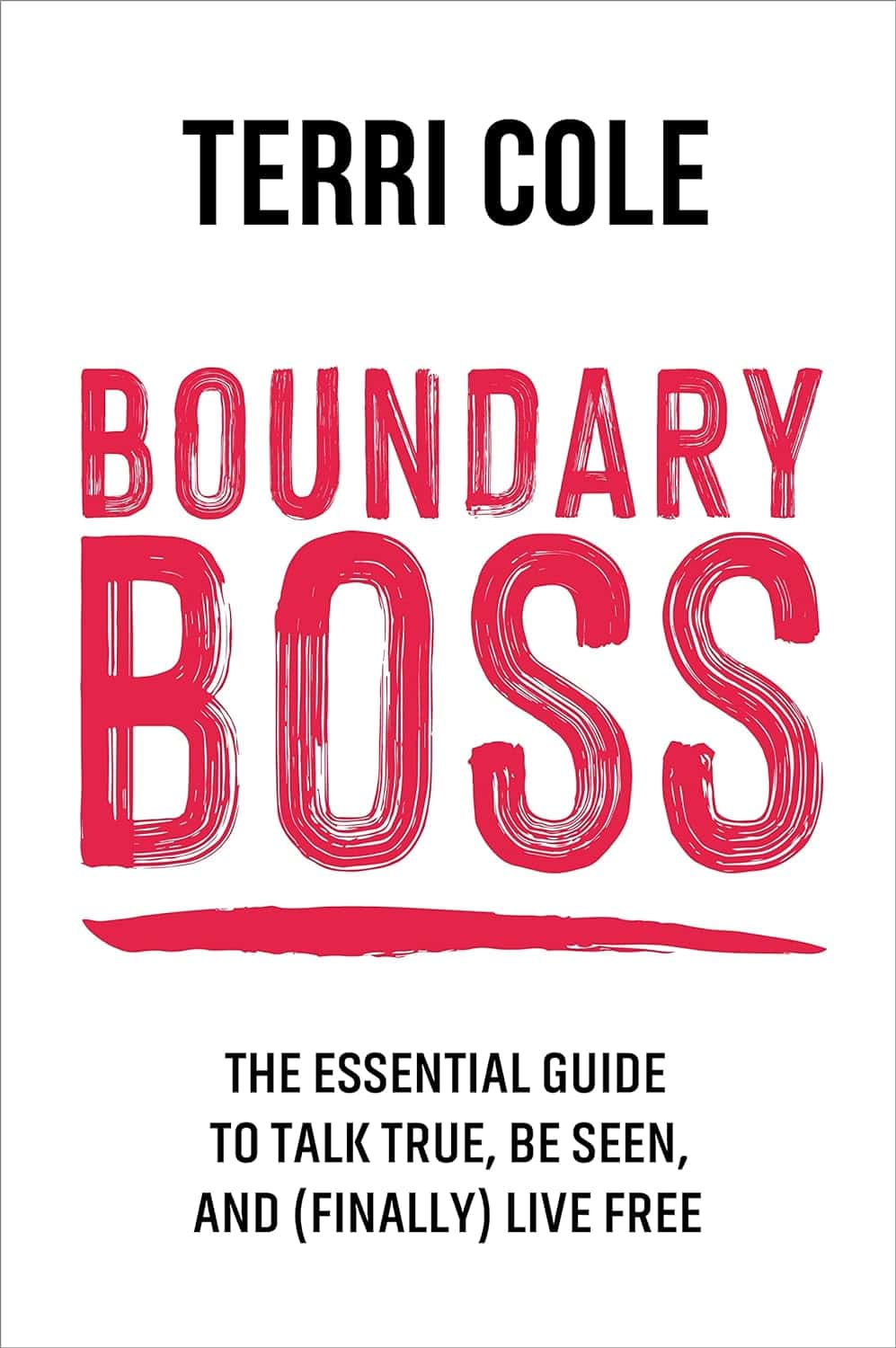Note: This post contains affiliate links. Read my policy here.
Does this sound familiar?
Your phone rings, and you pick it up right away.
You get an E-mail or text alert and stop what you’re doing to respond.
Somebody asks you for a favor, and your answer is always “yes.”
If any of these behaviors is routine for you, it’s likely that you are too accessible.
Being available for a friend or being willing to pitch in is a truly admirable quality. But constantly living your life that way comes with a cost.
You can never be everything to everyone. So people are invariably left disappointed.
And things you would have liked to have accomplished — or even those things you promised other people you would do — well, they never get done.
So it’s time to stop being so available! It’s time to find that perfect balance of being a warm, generous person while taking care of yourself and prioritizing your time.
So how can you learn to say no, set boundaries, and lovingly stop being too available?
Jump to . . .
- Understand your limits
- Identify what’s not in your lane
- Be your own best friend
- Deal with boundary busters
- Identify the fear
- Stop feeling guilty about saying no
- Set up a velvet rope
- Recognize when you need to butt out
- Delegate
- Internalize your boundaries bill of rights
- Get going with these boundary books
Understand your limits.
In today’s world, women are often expected to do it all.
But the truth is that you are a human being — a mere mortal. And your resources are finite.
- You have only so much time.
- You have only so much energy.
- You have only so much money.
- You have only so much space.
And when you’re dealing with a limited quantity of anything, you need to plan how you’re going to use that thing to its maximum potential.
In other words, it’s time to evaluate your priorities and what truly is (and isn’t) a good use of your limited resources.
Identify what’s not in your lane.
Let’s start by acknowledging that we all have commitments we’ve made and responsibilities to uphold. We’re honor-bound to abide by the agreed-upon rules of the relationships in our lives and to follow through on the promises we’ve already made.
But that doesn’t give the world carte blanche in claiming ownership of you.
As a self-directed individual, you’re a free agent.
So . . .
- If the head of the PTA wants you to volunteer for a future fundraiser, you can say no.
- If your kid wants to sign up for the travel volleyball team and have you chauffeur her around every weekend, you can say no.
- If your boss wants you to start doing the work of two people for the salary of one, you can say no.
You are within your rights to say no.
Be your own best friend.
Odds are, you’re a pretty great friend.

So why do that to yourself?
Start treating yourself the way you’d treat a dear friend:
- Offer yourself respect and love.
- Be understanding of your needs, your feelings, your opinions, and your limitations.
- Happily allow yourself time to unwind and pursue self-care.
- Take care of yourself physically by ensuring you get the sleep and downtime you need.
Put yourself back on the list of our priorities. You may be surprised to find that giving yourself some time, some rest, and some attention actually means you have more to share.
And understand that you teach people how to treat you.
When you value yourself, your time, and your well-being, people will be more inclined to treat you and your gifts as valuable.
Deal with boundary busters.
Of course, you’ve likely run into at least a few boundary busters in your life. These are the people who truly don’t care about your needs, limitations, feelings, and boundaries.
Maybe they’re too focused on what they want to care about what you need. Maybe they’re even a narcissist or someone with borderline personality disorder.
Dealing with someone like that can catch you offguard.
After all, it’s natural to expect other people to behave how you might. If you asked a favor of someone and she kindly said no, you might be disappointed, but you’d probably understand. You wouldn’t guilt her, browbeat her, vilify her, or start a smear campaign.

When you’re dealing with a boundary pusher, you probably feel significant self-pressure to say yes even when you want to say no. Because you don’t want to deal with the fallout.
And the result is that you feel like a hostage to your sense of obligation — though you’re not truly obligated to say yes.
But think about this:
Is it fair that the obnoxious, self-focused people in your life get that power over you?
You might politely decline a request from a friend who can lovingly accept your no, but you’ll say yes to the boor with no boundaries? And you’ll do it at the cost of your own happiness?
The solution isn’t necessarily easy for someone with empathy to do: Try realizing that the other person’s reaction to your perfectly reasonable no is their problem.
You are not responsible for that person’s feelings or happiness.
So, if you lovingly say no, and the other person throws a tantrum, that’s on them. They’re entitled to their feelings. But they’re not entitled to your time, your yes, or even your presence for their temper tantrum.
Of course, we want people to like us and be happy with us. But sometimes, you need to try to be okay with the fact that the boundary buster in your life isn’t happy with you.
Accepting that someone else will be unhappy with your response can give you the freedom to live your own life instead of feeling indentured to someone who has no claim to you.
Identify the fear.
Often, just speaking aloud the reason you’re afraid to say no can give you immense clarity.
With boundary busters, the fear might be backed up by a prior negative experience. So you might say, “I’m afraid this person will yell at me” or “I’m afraid he’ll gripe about me to our mutual friends.”
But you can apply this concept of identifying your fear when it comes to saying no in any situation:
- “I’m afraid people won’t like me if I say no.”
- “I’m afraid I won’t be needed if I say no.”
- “I’m afraid people will think I’m selfish if I say no.”
- “I’m afraid people will judge me as a bad mom / not a team player if I say no.”
What’s your fear in a given situation? Why do you feel pressured to say yes when you want to say no?
Once you clearly state your fear, you can address it directly.
Remember: What would you say to your best friend if she spoke that same fear to you? Speak your truth in response to that fear — aloud, if you’re willing! — and see if that conversation with yourself shrinks that fear.
Stop feeling guilty about saying no.
If you’re not accustomed to boundaries — or even if you’re just a human being with a strong sense of obligation or empathy — it can be tough saying no. That’s especially true if you’re turning down someone you care about.

Tell yourself this:
#1: You have other priorities.
You have a lot going on — plenty of goals you want to reach and tasks you want to accomplish, other relationships you want to nourish, and self-care that definitely should earn a spot on your to-do list.
Saying yes to something means saying no to something else.
So, when you say yes out of obligation, you’re choosing to participate in something that isn’t a priority for you while abandoning something that is.
#2: People who truly care about you don’t want you to say yes out of obligation.
Think about those kind and loving people.
They’d legitimately feel guilty if they found out you weren’t fully invested in giving your time, energy, or talents when you grudgingly agree to something for them. (Wouldn’t you?)
So you’re doing everyone a favor by saying no.
#3: You don’t want to resent your loved ones.
The people you choose to have in your life should make you feel happy — at least most of the time! If you always feel compelled to pick up the phone when your friend calls, you might start to resent her whenever you hear that ring.
Putting boundaries in place can free you to create a relationship that works for both of you instead of tarnishing that relationship with irritation.
#4: You respect other people’s boundaries.
Would you give your friend a hard time if she needed a quiet night in? Probably not.
So — if you’re the type of person who respects other people’s boundaries — expect the same from them. Relationships are, after all, a two-way street.
#5: You can learn who people really are.
It’s better to find out sooner — rather than later — which people in your life don’t respect the boundaries of others. Or which people think a relationship isn’t a mutual thing but something exclusively for their benefit.
Does that kind of discovery hurt? Absolutely.
But truth is power.
Learning who in your life is a boundary buster can give you valuable information as you navigate your relationships . . . and free you up to foster the ones that are sincere.
Set up a velvet rope.
Your personal resources shouldn’t be up for grabs in a bargain bin.
We already looked at the reasons why boundary busters with obnoxious demands shouldn’t get dibs on you. But who should get the VIP treatment in your life?

Maybe, for you, those people include your spouse, your kids, your closest friends, or other special people. For them, you’ll go above and beyond, even if that means making a personal sacrifice now and again.
In practice, that might mean that you set a firm boundary of leaving the office by 5 to spend time with your family. Or you’ll gladly rearrange your schedule if it means catching up with a good friend who’s flying in for the weekend.
Take some time to look at the relationships in your life. Don’t base your VIP access list on who demands or feels entitled to your resources. Don’t let yourself be guided by guilt and grudging obligation.
Instead, ascertain which people you want to let into that privileged inner circle.
Recognize when you need to butt out.
“Not my circus, not my monkeys.”
Many of us — particularly women — are trained to believe we have to do things for other people that they really should be doing for themselves.
We think it’s up to us to single-handedly manage the household, chase people regarding upcoming deadlines, help adult kids find jobs, guide friends in navigating their interpersonal relationships, and more.
Sometimes handling everything is so ingrained that it doesn’t even occur to us that the job is not ours (or not ours alone). And sometimes we don’t think the other person is capable of handling their business.
Author Russell Friedman once said, “Giving people unasked-for advice or criticism robs them of their dignity.” And I’ll respectfully add the corollary that unasked-for “help” does the same.
Everyone has their own journey that can’t be rushed.
Think back on your own life and how you had to make mistakes, learn things, and grow in your own time and your own way. Pushing in where you don’t really belong is not only ineffective in most cases but also damaging to your relationships.
So, instead, recognize what’s yours and what’s someone else’s to deal with.
Respecting the boundaries that other people have just by virtue of being humans helps you grow in your own sense of boundaries. (And butting out frees you up to dedicate more time and energy to your own priorities!)
Delegate.
While there’s plenty in life that’s someone else’s responsibility, it’s likely you yourself have tons on your plate!

It’s not all up to you.
If you’re overwhelmed with home projects you’ve taken on individually, get the spouse and kids more significantly involved. (They live there too!)
Hire professionals to paint your bedroom instead of spending your weekend toiling.
Use technology to your advantage. Set up an E-mail autoresponder to send an out-of-office message when you’re off the clock. Let voicemail pick up those phone calls that come in at inconvenient times. And train your inbox to be more efficient for you.
Internalize your boundaries bill of rights.
So you’ve decided not to volunteer for that committee at your kid’s school. You’re not cleaning up the mess your kids made. And you’re not making an exhaustive cross-country trip to visit family for the holidays this year.
Stop apologizing.
Of course, be polite. Be sensitive. But be authentic to yourself and your needs.
Remember: You don’t need to . . .
- Justify or defend your choices: The way you choose to spend your resources is entirely up to you.
- Explain: Offering an excuse for your absence is truly not necessary. “Sorry, I can’t make it this time!” is a perfect response.
- Offer proof: You’re not required to prove that you have a more important commitment in order to decline an invitation. (And other people aren’t entitled to demand proof.) Even if you’re just staying home, your commitment to yourself to relax instead of going out is important!
- Respond immediately: Especially if you get tongue-tied in the moment, put a pin in any invitation or request for help. Simply state, “Thanks! I’ll let you know tomorrow.” Follow up via e-mail or text if it makes you feel more comfortable.
- Meet unreasonable expectations: You’re not obligated to attend every event — even if your family, school, or place of business has an unwritten expectation that you’ll always be there. An invitation is not a court summons!
- Participate in arguments: Arguments take two willing participants, and no one can force you to be one of them. Start declining invitations to arguments about your life choices. If someone wants to squabble over your decisions, politely state that the topic isn’t open for discussion.

Remember: By creating and setting healthy boundaries, you’re showing yourself respect, creating honesty in your relationships, and teaching your kids how to do the same for themselves.
Get going with these boundary books.
If you’re looking for a deep dive into personal boundaries — what they look like, how to apply them in different relationships and situations, actual scripts to set and enforce them, and practical exercises to complete — here are some books I highly recommend:
Boundaries (Updated and Expanded Edition): When to Say Yes, How to Say No To Take Control of Your Life

The Bible of boundaries, this New York Times Bestseller has been read by millions since its first publication three decades ago. Updated for a new era, this practical book first walks you through the mechanics of boundaries, how they work, and common misconceptions.
Then, you’ll step through individual chapters that address boundaries in each type of relationship in your life — family, friends, spouses, children, employers, and more.
Don’t forget to check out even more books in the same series by these authors:
- Boundaries Workbook
- Boundaries in Marriage and the Boundaries in Marriage Workbook
- Boundaries with Kids and the Boundaries with Kids Workbook
- Boundaries in Dating and the Boundaries in Dating Workbook
- Boundaries with Teens
- Boundaries for Leaders
- Beyond Boundaries: Learning to Trust Again in Relationships
Boundary Boss: The Essential Guide to Talk True, Be Seen, and (Finally) Live Free
Boundary Boss eases you first into examining why you may have trouble with boundaries. Gently guiding you to examine your past, Cole helps you separate past triggers from current realities.
She then walks you through the process of creating your “new normal” as you build boundaries proactively and confidently and manage the “Boundary Destroyers” in your life — those people who don’t care about your boundaries.
Cole offers specific sections on real-world scripts, journaling exercises, and meditations.
Want to get a preview of Cole’s insight into boundaries? Check out this compelling and insightful interview with Marie Forleo:
So many people feel too guilty to set healthy boundaries and stop being available to everyone around them. But, when you learn to say no, you free yourself to have mutually beneficial and fulfilling relationships.
You acknowledge that you and your own needs and goals are a priority. And you stop living a life of obligation and transition to a life of intention and personal freedom.
In what way are you too available? What steps will you take to overcome that?









Leave a Reply